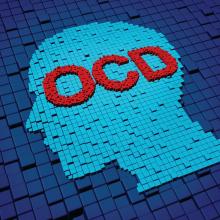Obsessive-compulsive disorder could be detrimental to educational attainment, particularly if diagnosed before the age of 18 years, according to a study published online Nov. 15.
A Swedish population-based birth cohort study identified 15,120 individuals who had been diagnosed with obsessive-compulsive disorder (OCD, 11,482 of whom were in families with full siblings discordant for OCD.
The researchers found that individuals with OCD were significantly less likely to pass courses in the last year of compulsory education; 44% less likely than a full sibling to pass a Swedish language course, 40% less likely to pass an English language course, and 48% less likely to pass in mathematics (JAMA Psychiatry. 2017 Nov 15. doi: 10.1001/jamapsychiatry.2017.3523).Individuals with OCD were also 57% less likely to complete upper secondary school, 28% less likely to start a university degree, 41% less likely to finish that degree, and 48% less likely to complete postgraduate education, compared to individuals without OCD.
“The association was global rather than being limited to a particular course; patients were more likely to fail each of the core and additional courses in compulsory school and less likely to achieve each level of education, from primary school to postgraduate education,” wrote Ana Pérez-Vigil, MD, of the Center for Psychiatry Research at Karolinska Institutet, Stockholm, and her coauthors.
The authors noted that as the education impairment seemed greatest at the end of upper secondary school but reduced during university, individuals with OCD might cope better with their symptoms as they age or receive evidence-based treatment.
“These individuals might be able to find alternative routes to access university, such as the locally funded school system for adults who have failed to complete primary or secondary school (known as komvux in Sweden),” they wrote. “Thus, early educational failure does not necessarily condemn individuals to lifelong educational ostracism.”
People with OCD also were 53% less likely to be eligible to access a vocational program (95% confidence interval, 0.45-0.50) and 49% less likely to be eligible for an academic program in upper secondary school (95% CI, 0.58-0.63), compared with the general population, after adjustment for factors such as sex, year of birth, and parental age at birth of the participant.
Early diagnosis – before the age of 18 years – was associated with even worse educational outcomes, compared with those diagnosed after the age of 18.
Excluding individuals with other comorbidities such as attention-deficit/hyperactivity disorder attenuated the results slightly, but individuals with OCD still showed significantly worse educational attainment than that of the general population.
Dr. Pérez-Vigil and her coauthors said detecting and treating OCD early might help patients “fulfill their educational potential.”
Several authors of the study were supported by grants from the International OCD Foundation; the Alicia Koplowitz Foundation; the Swedish Research Council for Health, Working Life, and Welfare; and the Karolinska Institute. Two authors declared royalties from a publishing company, and one declared speaking fees and a research grant from Shire Pharmaceuticals, all of which were outside the submitted work. No other conflicts of interest were declared.


